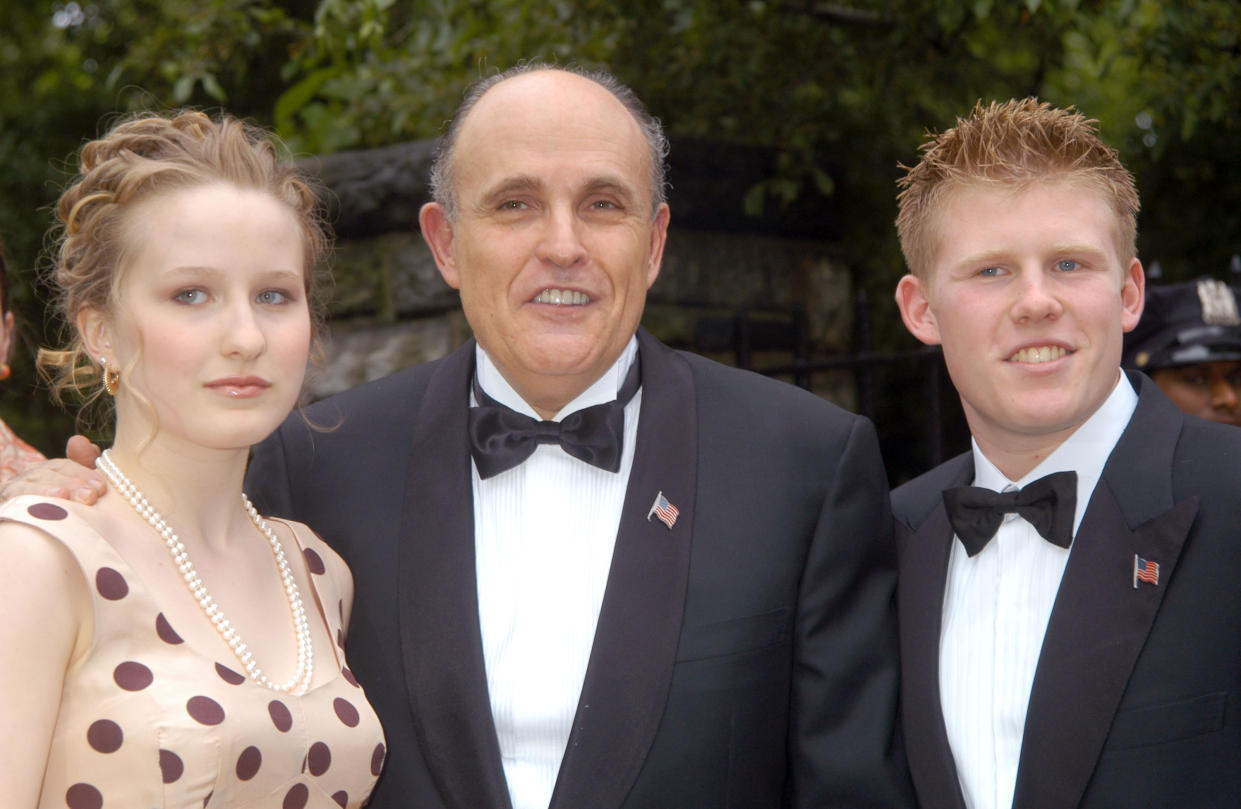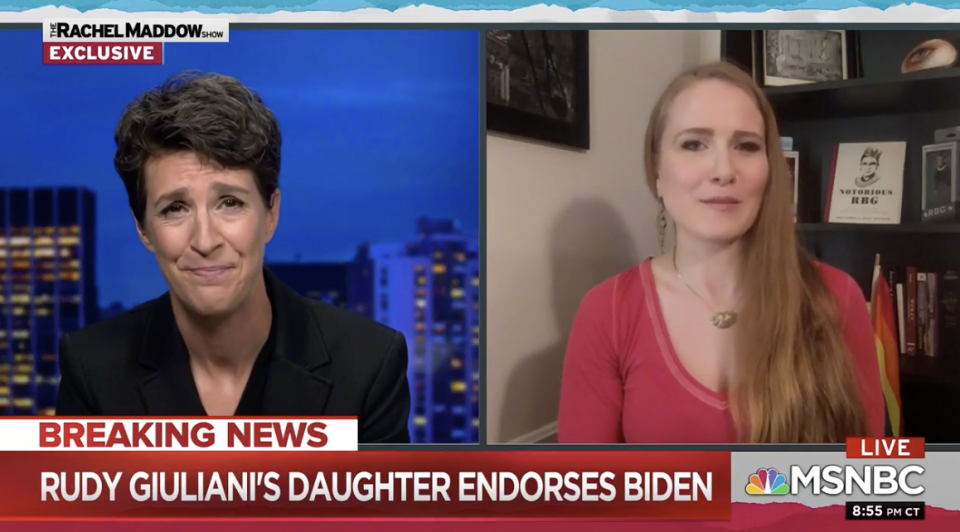Why Caroline Rose Giuliani, Claudia Conway and other kids of politicians publicly denounce their parents

In the category of Kids of Politicians Gone Rogue, Thursday was a big day.
That’s when Vanity Fair published its mic drop of a first-person piece, “Rudy Giuliani is my father. Please, everyone, vote for Joe Biden and Kamala Harris,” by Caroline Rose Giuliani. In it, the 31-year-old filmmaker (who calls herself an all-caps “LIBERAL” on Twitter), says of her dad, President Donald Trump’s personal attorney, “We are multiverses apart, politically and otherwise. I’ve spent a lifetime forging an identity in the arts separate from my last name, so publicly declaring myself as a ‘Giuliani’ feels counterintuitive, but I’ve come to realize that none of us can afford to be silent right now. The stakes are too high.”
"I may not be able to change my father's mind, but TOGETHER, we can vote this toxic administration out of office."
-Me 🙋🏼♀️
I wrote a thing. Please vote for @JoeBiden to save this country!! https://t.co/8CDQ5PWugt— Caroline Rose Giuliani (@CarolineRoseGiu) October 15, 2020
As a result, social media and all media, for that matter, went wild, with Rachel Maddow having Caroline on her show as an exclusive featured guest, and a flurry of stories excitedly noting Caroline’s desire to “end this nightmare” and “vote this toxic administration out of office.”
It may have felt like a shocking line crossing to some observers, but still, Caroline is far from alone in using a very public forum to throw her political parent under the bus.
Just recently, we’ve seen Claudia Conway, the 16-year-old daughter of former White House senior adviser Kellyanne Conway and Lincoln Project founder George Conway, post TikTok videos sparring with her parents’ political beliefs (as well as outing her mom’s COVID-19 diagnosis). We’ve watched, open-mouthed, as Stephanie Regan, 23, tweeted during her father Robert Regan’s Republican primary campaign for State Legislature in September, “If you’re in Michigan and 18+ pls for the love of god do not vote for my dad for state rep. tell everyone.” (He lost.)
Though he won his seat, Republican Missouri House candidate Steve West was first publicly denounced by his son and daughter, Emily and Andy, with Andy bluntly warning, “My dad’s a fanatic, he must be stopped. His ideology is pure hatred. It’s insane.”
Even in politically involved celebrity circles, we’ve recently watched Jack Quaid denounce Trump with an expletive — right after his movie-star dad Dennis Quaid agreed to take part in a COVID-19 “defeat despair” campaign ad for the president —and Hailey Bieber endorse Joe Biden with an Instagram post, on the same day her actor dad, Stephen Baldwin, tweeted his own support for Trump.
Watching this cascade of public parental denouncements can trigger, for anyone who has ever had a heated political argument with a parent and found it to be a deeply upsetting experience, a mix of wonder, disbelief — and maybe even pride. But how do they do it? And why? Barbara Greenberg, a Connecticut-based psychologist, points partly to the power of social media.

“I think that doing it this way might actually be easier than facing your parents at Thanksgiving dinner or Christmas,” she tells Yahoo Life. “Because when people are doing things on social media, there is some sense of anonymity, as they’re not looking people in the face. There are studies that show we tend to be slightly more aggressive or assertive online than in person. But when we are faced with our parents, and disagreeing, we regress. We often don’t feel like we’re being taken seriously.” So, by drawing the public into the conflict, Greenberg notes, it ensures that people will bear witness and that some, at least, will express support.
While, traditionally, parents are the most powerful political influence on any child, noted the New York Times recently, with a 2018 study in The Journal of Politics finding that more than three-quarters of children whose parents share the same party affiliation will adopt their family’s political views — to wit: Chelsea Clinton, Meghan McCain, the Kennedy and Bush families. But, the story noted, recent research has found social media to be one of the reasons why young people would disagree politically with their family.
if you’re in michigan and 18+ pls for the love of god do not vote for my dad for state rep. tell everyone
— 👑STEPH👑 she / hers (@streeganz) June 23, 2020
“Previously, exposure to information about politics was contained to the family,” Chris Ojeda, an assistant professor of political science at the University of Tennessee who studies children’s political beliefs, told the New York Times. “Parents were gatekeepers. Now they have much less control. The internet has democratized learning about politics.” Amy Gross, a child psychologist, concurred, noting that while young people used to rebel against the family with their appearance — clothes, hair, piercings — now it’s through social media.
“Differentiating from the nuclear family is the key developmental task for all teenagers and young adults,” Dr. Pamela Rutledge, psychologist and director of the Media Psychology Research Center, tells Yahoo Life. “This leads to a series of behaviors that may be perceived by others as risky, rebellious or foolish, from engaging in forbidden behaviors and wearing the ‘right’ clothes to signal peer affiliation to rebellion.”
While we can’t know what else these children of politicians have done to “differentiate,” Rutledge explains, “the digital landscape means that there is a lot more access to other role models, and it’s much easier to have a voice,” something that’s particularly needed when you’ve grown up with parents who “do not give their children much room to come to their own conclusions.” That, she adds, increases the chances of rebellion.
And expressing your own ideas through social media, then, is especially a natural go-to for any young person who has become accustomed to a lack of privacy, due to the fame of their parents.
“It makes sense that these kids are expressing their opinions publicly because their parents are public people … it’s their parents’ preferred mode of interacting with the world, and they [want to] try their hand,” Greenberg suggests.
Further, she adds, for all of the aforementioned parent-condemning offspring, “I’d think there would have to be some excitement in asserting their opinion publicly and thinking that perhaps they, too, would like to be heard. … They have loud, out-there parents, and while I don’t know any of these young women, I don’t know how heard they feel within their families. These are very busy parents. So maybe this is a good way to get some kind of response or reaction from their parents.”
Motivations may differ slightly depending on the age of the child, says Greenberg, noting that, “With Giuliani’s daughter, and the others who are older, they are likely just trying out their voices publicly, too, and … as they’ve learned from their parents, social media is a really excellent way to do that.” With Conway, who is still a teenager, “I think this daughter seemed angry at her mother … so that may have partially motivated her behavior.”
In any event, she says, one thing is clear in all instances: “They don’t want to be blended in with their parents, and don’t want people to assume that they’re sharing their parent’s viewpoint.”
Editor's note: This post was updated on Oct. 20, 2020 to reflect that Hailey Bieber is Stephen Baldwin's daughter. She was initially identified as Billy Baldwin's daughter.
Read more from Yahoo Life:
Celebrities are using bikini pics to encourage voter registration. Data shows it's working.
You can now dress up as a sexy ‘Mail-in Ballot’ for Halloween, thanks to Yandy
Want lifestyle and wellness news delivered to your inbox? Sign up here for Yahoo Life’s newsletter.



